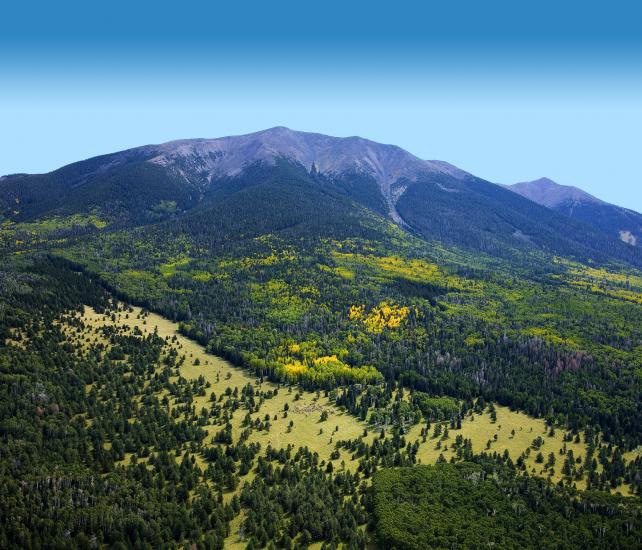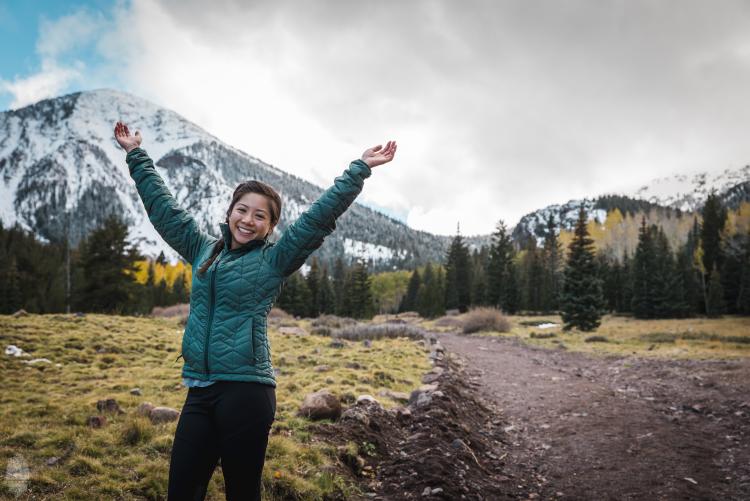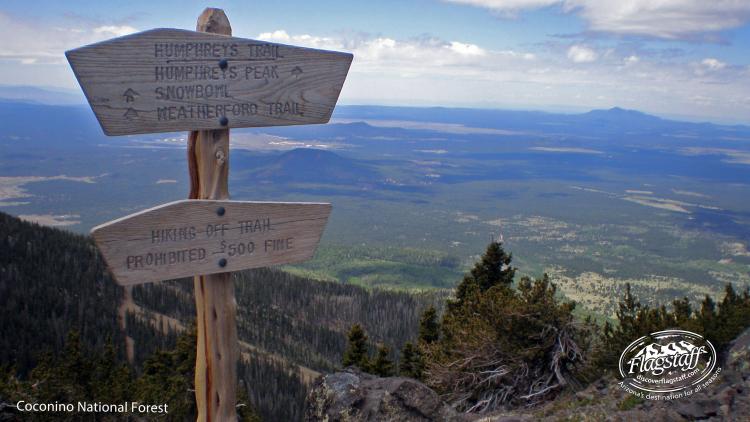
Outdoors and Nature
Flagstaff is a year-round haven for outdoor enthusiasts and a playground for the young at heart, boasting breathtaking scenery and a wealth of distinctive opportunities to explore nature.
Experience Humphreys Peak with our in-depth guide on directions, the perfect seasons to visit, and more.

Embark on an outdoor journey in Flagstaff, where the state’s highest natural point awaits. We’re confident that this adventure will “peak” your interest! Humphreys Peak is a geological phenomenon, standing with an elevation of more than 12,000 feet. Nestled in the Kachina Peaks Wilderness of Coconino National Forest, Humphreys Peak is the highest point of the San Francisco Peaks—a collection of dormant volcanoes.
Whether you’re hiking this eroded stratovolcano for the first time or returning as a seasoned adventurer, we’ve got you covered with everything you need to know about Humphreys Peak. Trust us, scaling the mountain is truly “snow” laughing matter.
Take your mountain hiking adventure to new heights with our guide! The hike to Humphreys Peak is 9 miles long and is regarded as a difficult trail. With an elevation gain of 3,356 feet, it typically takes an average of 6 hours to finish the hike. Beginning in a ponderosa pine forest, the hike gives way to rocky terrain. Prepare for some scrambling at the top as there are false summits and loose rocks. The area above the treeline is generally breezy and open. If you’re hiking in the late summer, it’s suggested to begin your trek early as there are frequent occurrences of afternoon storms.
Fun Fact: Humphreys Peak was named in 1873 after Civil War Union General Andrew Atkinson Humphreys.

Situated 14.5 miles from downtown Flagstaff, Humphreys Peak can be reached via US 180 north for seven miles, and then Snowbowl Road (FR 516) for seven-and-a-quarter miles to the lower level of Arizona Snowbowl’s parking lot. The start of the trailhead is located at the northside of the parking area.

The best seasons to enjoy Humphreys Peak are early fall and late spring. Schedule your outing with our guide on the current weather conditions of the Flagstaff region. The forecast on the top of the mountain can rapidly shift into rainy and windy situations.
Depending on the season, it’s generally recommended to wear snowshoes, as well as microspikes or crampons. Softshell pants, compression clothes, a fleece, and a windproof jacket are additional must-haves for this journey.
Humphreys Peak is considered a difficult hike with the chance of snowy conditions appearing during any time of the year above the treeline.
Hikers do not need a permit to hike through Humphreys Peak. However, it is still encouraged to uphold Leave No Trace practices, as well as the signs of regulations in the Kachina Peaks Wilderness.
The hike to Humphreys Peak varies depending on the skills and pace of each individual, but an adventure can last from four to 11 hours.
If you’re hiking on a sunny day, you can see the majestic Grand Canyon National Park! In addition, we suggest taking in sweeping views of the Hopi mesas, Verde Valley, Oak Creek Canyon, and the Painted Desert.
Humphreys Peak is the tallest natural point in Arizona, revealing stunning sights at 3,851 above sea level.
Visitors are not permitted to camp above the treeline at Humphreys Peak. It’s allowed to camp below the treeline, but visitors are encouraged to maintain some space from the hiking route.
Humphreys Peak is one of the dormant volcano peaks that form the San Francisco Peaks.
The terrain of Humphreys Peak was molded by small glaciers during the ice ages of the Pleistocene Epoch.
While snow is not a permanent condition on Humphreys Peak, snowfall can happen year-round above the treeline. While snow is not a frequent occurrence in the summer, it can remain at the peak until June and begin to build up in September.
Dogs are permitted on the Humphreys Peak route, but your canine companion must be guided on a leash.

Flagstaff is a year-round haven for outdoor enthusiasts and a playground for the young at heart, boasting breathtaking scenery and a wealth of distinctive opportunities to explore nature.